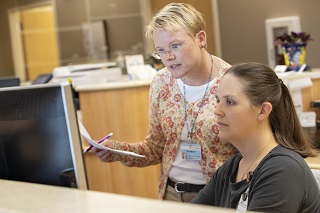WHAT IS CHEMOTHERAPY OR TARGETED THERAPY?
Chemotherapy is the administration of anti-cancer drugs that are cytotoxic. This means they act by killing cells that divide rapidly, one main property of most cancer cells.
Targeted therapy (sometimes called biologic therapy) is more directed therapy than chemotherapy, tailored to attack cancer cells based on specific genetic or cellular features.
Depending on diagnosis, chemotherapy or targeted therapy may be combined together or with other treatments.
Patient cancer treatment plans are prescribed in consultation with our highly skilled oncologists and administered by oncology-certified nurses. Advanced nurse practitioners (ANPs) help our physicians educate our patients on their treatment and manage side effects due to treatment.
Katmai Oncology Group offers an integrative approach to cancer care and treatment. Our Integrative Services are available to all our patients to help treat mind, body and spirit.
Important Chemo Self-Help Information
Chemotherapy can have a variety of side effects with varying intensities. There are many things that patients can do themselves to alleviate the symptoms of these side effect. Below you will find some helpful documents to aid patient self-help.
Watch video about Chemotherapy Basics
Learn More About:
- Complete Blood Count Test
- Low Red Blood Cell Count
- Low Platelet Count
- Low White Blood Cell Count
- Constipation
- Loss of Appetite
- Diarrhea
- Esophagitis
- Nausea and Vomiting
- Mouth Sores
- Peripheral Neuropathy
Frequently Asked Questions
Can I exercise?
Try to maintain a normal daily routine. Mild to moderate exercise helps relieve stress, increase appetite, enhance a good night’s sleep and maintain muscle strength. Therefore, we recommend any activity that you feel comfortable doing, such as walking or biking for example.
What should I eat and drink?
The best way to get the recommended daily amount of vitamins and minerals is through a balanced diet. However, there will be days during your treatments that you do not feel like eating. Keep yourself well hydrated by drinking lots of fluids, more than 1 liter (4 cups) of fluid daily.
Can I take supplements?
We recommend a multivitamin daily. Do not take more than the recommended daily allowance (RDA) of antioxidants A, C or E. Many people read or hear about a large number of products that claim to deliver a wide range of benefits from prevention to cure of their disease. Shark’s cartilage, herbs (like Echinacea) and mega doses of vitamins are a few examples of these products.
However, there is no scientific evidence to support these claims. In fact, some of these may be harmful. For example, high does of vitamin C (more than 1 gram) are poorly absorbed and may cause diarrhea. High doses of vitamin E may interfere with platelet function. Excessive doses of vitamin A can lead to swelling of the liver and brain. Too much calcium can cause kidney stones.
Your body can only use a certain amount of anything and then must get rid of the excess. Your body is already working hard to rid itself of your disease and to repair your normal cells injured by treatments. It does not need the added task of getting rid of extra vitamins or herbs. In addition, many “natural” products (for example, willow bark, botanicals, herbs and animal extracts) are unable to be absorbed by the body and “natural” is no guarantee of a product’s safety or effectiveness.
Which non-prescription medicines are safe to use?
Over-the-counter medicines can be used occasionally. Aspirin and any products containing aspirin should be avoided. Aspirin interferes with blood platelets and may lead to bleeding.
For minor headaches and mild muscle aches, use Tylenol. For diarrhea, use Pepto Bismol or Immodium. For constipation, use Milk of Magnesia, Colace, Senokot, and Miralax.
If any of the above symptoms are not relieved by these medications OR if you experience a fever or flu or cold-like symptoms, please call your physician.

